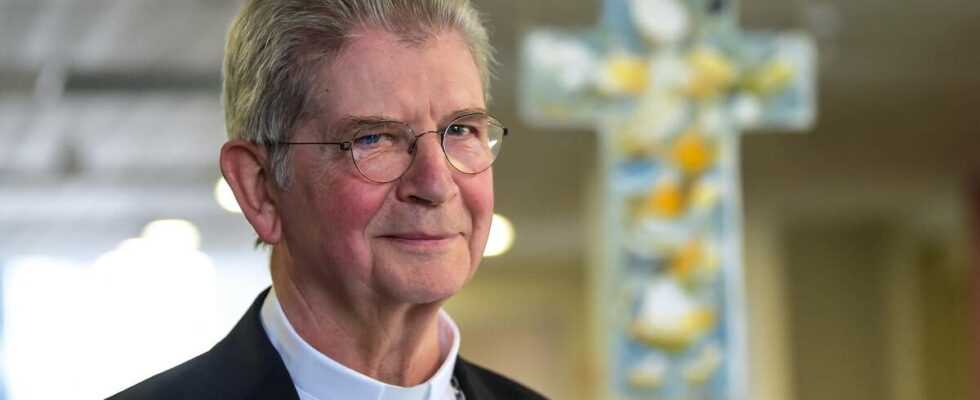The Pope on Tuesday made the Archbishop of Lille the successor of Michel Aupetit, forced to resign at the end of 2021. At 70, he is the supporter of a social Christianity, attentive to the cause of refugees and less conservative and centered on bioethical issues than his predecessor.
“It’s still surprising this fashion of naming septuagenarians!” sighed a media Catholic priest last week when the name of the new archbishop of Paris began to circulate insistently. Confirming these rumors, the Pope on Tuesday appointed the Archbishop of Lille, Laurent Ulrich, 70, at the head of the most powerful diocese in France, endowed with 116 parishes, 477 priests and a real estate heritage estimated at a minimum. to 700 million euros. Ulrich, less conservative and more “Francois-compatible” that his predecessor, succeeds Michel Aupetit, forced to resign, at the end of November 2021, following rumors of supposed female liaisons which he has always denied.
A heckled diocese at the hands of a “centrist”
In fact, the pope has chosen a man of experience to take over a diocese that has been very disrupted in recent years by the brutal management of Aupetit. Ulrich, originally from Dijon, first trained in philosophy before entering holy orders, was first Archbishop of Chambéry from 2000 to 2008 then Archbishop of Lille. Under the presidency of Cardinal André Vingt-Trois, he exercised, from 2007 to 2013, the vice-presidency of the Conference of Bishops of France (CEF). His name was already on the list of favorites, in 2017, when Aupetit was appointed head of the diocese of Paris.
“He is a good and upright man”, said of Ulrich Benoist de Sinety, parish priest in Lille and former vicar general (i.e. right arm of the bishop) of Paris. From the outside, the Archbishop of Lille appears cold. This is denied by a bishop, one of his neighbors in the hemicycle in Lourdes where the plenary assemblies of the episcopate are held twice a year. “Ulrich is pretty coolsums up this prelate. Critics of the Archbishop of Lille also accuse him of a lack of charisma. In short, Ulrich would have a fairly techno profile, coming from the ecclesial nomenklatura. In any case, he knows perfectly the workings of the institution and those of the political world, which is a serious asset at the head of the diocese of Paris, its archbishop playing an eminently political role.
On the politico-religious chessboard, the new archbishop of the capital is a “centrist”, holding a social Christianity, attentive to the cause of migrants and the poorest. “Seeking justice for the poorest and seeking the reasonable use of this world in which we live are the same path of conversion”, he said in his All Saints 2021 homily. He is less focused on bioethical questions than Aupetit, who had made them his hobbyhorse. This appointment appears as a refocusing of the French Catholic episcopate, increasingly under pressure from conservative currents. It comes in a difficult context for the community, still reeling from the revelations of the Sauvé report on the sexual violence committed in the institution and the massive vote of Catholics on the far right during the presidential election.
Installation May 23
The assumption of duties will take place very quickly, in barely a month. Laurent Ulrich’s installation mass will be celebrated on Monday May 23 at the Saint-Sulpice church, the diocese’s interim cathedral since the fire that ravaged Notre-Dame. Since the resignation of Michel Aupetit, the management of the diocese had been entrusted to Georges Pontier, the former archbishop of Marseilles and ex-president of the CEF. Acting as a “wise old man”, Pontier, to whom the pope has entrusted missions of pacification since he retired, also knows the French episcopate very well.
In the Battle of Paris (the position is the most prestigious in the hexagonal episcopate with that of Lyon), his opinion certainly weighed, just like that of Vingt-Trois, one and the other more centrist than the current direction of the episcopate. “Ulrich’s name appeared immediately after Aupetit’s resignation. But he was dismissed, initially, for reasons of age“says a well-informed source. The profile of the new archbishop of Paris nevertheless corresponds to what the apostolic nunciature (the Vatican embassy) was looking for, which plays a central role in the appointment of bishops.
“Add diversity”
In a kind of Macronian “at the same time”, Ulrich’s mandate appears both as a break and a transition. A rupture because it does not belong to the Parisian microcosm, as was the case of the last three bosses of the diocese of Paris. The “Aupetit crisis” revealed, in the capital, a kind of ecclesiastical inter-self, deadly in the long term. But a transition because Ulrich, aged 70, will have to submit his resignation to the pope in five years, according to the standards of the Catholic Church.
For the time being, the reception of this appointment has been rather mixed. It displeases the most conservative currents of the Catholic Church as well as the fans of Cardinal Jean-Marie Lustiger, stationed in Paris from 1981 to 2005 (they are often the same), the latter fearing that the heritage will be sold off lustigerian. “This is not what was the priority but rather to put diversity by not appointing a Parisian“, corrects a theologian. Many Parisian priests do not applaud either. They would have voted – if they had had the possibility – for Jean-Marc Aveline, whom they know better and whom they appreciate. The Archbishop of Marseilles, whose name had circulated for the post among many others, has, in fact, led several spiritual retreats for the priests of Paris. At 70, Ulrich will have to prove himself once again.
